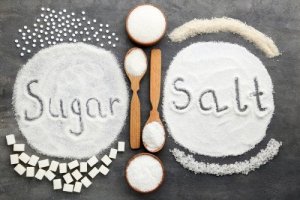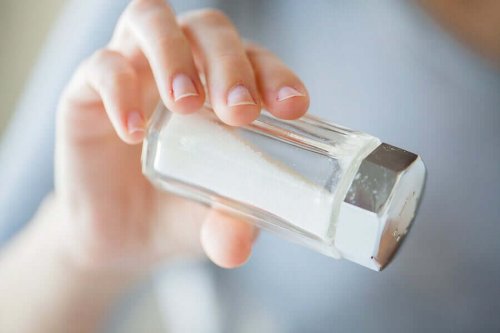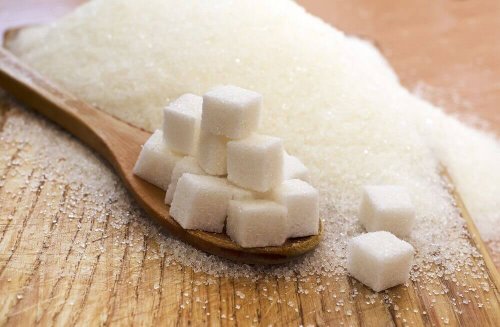Excessive Salt or Sugar Intake: Which Is Worse for Your Health?


Written and verified by the nutritionist Saúl Sánchez Arias
For many years, doctors have linked an excessive intake of salt and sugar to a wide variety of diseases. In fact, today, experts advise limiting their consumption to promote wellness. However, some people still wonder which is worse, excessive salt or sugar intake.
For a long time, people considered salty foods and fats responsible for a large number of diseases. However, as science and food studies progressed, many of these ideas have been dismantled.
Nowadays, doctors link many complex diseases to excessive sugar intake. So which is worse? Below, we discuss this issue in detail.
Excessive salt or sugar intake: Which is worse?
Salt
Salt used to be associated with atherosclerosis and elevated blood pressure. The truth is that the latest articles, such as the one published by The American Journal of Medicine, question this relationship.
Salt is a necessary element for life and the transmission of nerve impulses. Unlike sugar, humans must consume a minimum amount of salt so the body can perform its vital functions properly.
Moreover, the body isn’t prepared to synthesize it endogenously. You have to consume salt through your diet. In this regard, not getting enough of it may be associated with various complications, some of which are related to the thyroid gland and its pathologies.
The problems that were formerly related to salt intake are now associated with an unhealthy lifestyle. Obesity, a sedentary lifestyle, and high-calorie diets are risk factors for atherosclerosis. In addition, these unhealthy situations can alter blood pressure.

While it’s important to avoid excessive salt intake, it’s also important to consume a minimum amount to ensure the body can perform certain vital functions properly.
Before you go, don’t miss: 8 Foods You Should Avoid if You Have Hypertension
Sugar
This is one of the food industry’s preferred ingredients. Due to its flavor and texture, most processed products contain it. Although the WHO doesn’t establish a minimum required amount of sugar, it does establish a maximum recommended amount.
Sugar is mostly made up of glucose, which is a necessary substance for life and energy metabolism. However, it’s a nutrient that the body can synthesize on its own from proteins and fatty acids. Therefore, it isn’t essential.
Even considering that the requirements vary in sport situations, the current population’s sugar intake is well above the recommended amount.
This elevated intake is associated with an increased likelihood of excess weight and obesity. Also, it’s also a clear risk factor for many complex diseases such as diabetes and some cancers, as noted by a study published in the journal PLoS One.
Excessive salt or sugar intake: Which is worse?
Definitely sugar intake. This is because it isn’t an essential nutrient and its intake is associated with several diseases. It only becomes a necessary nutrient in sport situations, but salt is also a necessary nutrient in these cases.
Reducing your sugar intake, or even cutting it out of your diet entirely, has many health benefits. First of all, diabetes would no longer be an endemic disease.
Moreover, this would reduce obesity rates and, consequently, many associated problems, such as heart problems. Furthermore, this would reduce the incidence of certain digestive system-related cancers.

Experts associate an elevated sugar intake with an increased risk of chronic diseases. It’s worse than salt because it isn’t essential and cutting it out from your diet can benefit you in many ways.
Discover more here: 5 Tips to Control Sugar Cravings
How to reduce your sugar intake
One of the main problems you may encounter when you try to reduce your sugar intake is that your palate is used to it. The best thing to do is start by trying to replace very sugary processed products with their sugar-free versions.
Then, beginning to make them at home, without using sugar as a sweetener, may be a great choice. Using fruits is a great way to make your preparations taste sweet. Although they contain sugar, they contain much less than regular table sugar.
At the beginning, it’ll be really hard for you due to the fact that your palate enjoys processed foods. However, eventually, your “need” to consume industrial products will disappear and you’ll enjoy improved health.
In any case, regarding the debate about whether excessive sugar or salt intake is worse, the truth is that you shouldn’t consume any food in excess. The best thing you can do is to consume all foods in moderation.
Therefore, a flexible diet allows a responsible sugar and salt intake. Perhaps these diets are the best choices for combining health with pleasure when it comes to food.
All cited sources were thoroughly reviewed by our team to ensure their quality, reliability, currency, and validity. The bibliography of this article was considered reliable and of academic or scientific accuracy.
- Frisoli TM., Schmieder RE., Grodzicki T., Messerli FH., Salt and hypertension: is salt dietary reduction worth the effort? Am J Med, 2012. 125 (5): 433-9.
- Fuchs MA., Sato K., Niedzwiecki D., Ye X., Saltz LB., Mayer RJ., Mowat RB., Whittom R., Hantel A., Benson A., Atienza D., et al., Sugar-sweetened beverage intake and cáncer recurrence and survival in CALGB 89803 (Alliance). PLos One, 2014. 9 (6).
- Erickson J., Sadeghirad B., Lytvyn L., Slavin J., Johnston BC., The scientific basis of guideline recommendations on sugar intake: a systematic review. Ann Inter Med, 2017. 166 (4): 257-267.
This text is provided for informational purposes only and does not replace consultation with a professional. If in doubt, consult your specialist.








